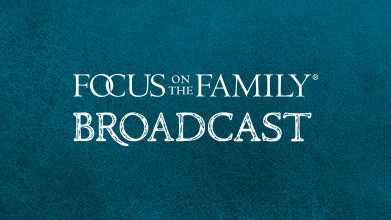Opening:
Teaser:
Woman: She and Frank are at Whit’s End so I told Marjorie we’d have them over Tuesday night to talk about Bruce.
Man: Mmmhmm
Woman: That is, if you think that we can help.
Man: Mmhmm
Woman: You’re not listening to me, are you.
Man: Mmhmm
Woman: Then I think I’ll invite some aliens…
Man: Mmhmm
Woman: …to lunch.
Man: Mmhmm
Woman: …at your office
Man: (yawns) Whatever you think is best, dear.
End of Teaser
John Fuller: Well, you and your spouse probably talk. But do you really hear and understand each other? We’re gonna cover that topic today on Focus on the Family with Jim Daly. It’s the topic of communication, one of the best and hardest parts of marriage. Your host is Focus president and author Jim Daly. And I’m John Fuller.
Jim Daly: Hey, John, here’s a news flash. Men and women are different. Uh, communicating with your spouse can sometimes feel like living in a foreign country, which I have done.
John: (Laughter).
Jim: I remember doing that in college. I moved to Japan for a year, studied at Waseda University. And it was crazy. I, uh – you know, first time I had been out of the country really in a big way, long stay like that. And it – it was a little intimidating. But I think marriage is somewhat like that. You have to figure out, uh, where the kitchen is, how are you gonna eat, how do you say food in a foreign (laughter) language, all those basics. And I don’t wanna oversimplify it. But, um, you know, kind of that strategy of how do you get down to figuring how you’re gonna (laughter) survive is a good idea within marriage. And our guest today is gonna help translate, uh, your spouse’s foreign language for you (laughter) and help all of us, I think, do a much better job in our marital relationships.
John: And joining us once again is Dr. David Clarke. He’s a psychologist, a very popular speaker and, uh, author of a number of books, including one that we’re gonna talk about today, Men Are Clams, Women Are Crowbars…
Jim: (Laughter) That is too true.
John: …The Dos And Don’ts Of Getting Your Man To Open Up. Uh, Dr. Clarke is, uh, married to his wife Sandy. Uh, sometimes he calls her the blonde. In fact, usually you call her the blonde, I think. Uh, they have four children. And he’s been on this broadcast a number of times.
Body:
Jim: David, uh, welcome back to Focus on the Family.
David Clarke: Well, my pleasure.
Jim: Hey David, let’s get into it. Men and women, uh, we confuse each other so much in the marital relationship. We don’t understand each other. We are different. Um, is it actually possible to understand each other? (Laughter) There’s the opening question. Can we get there?
David: No, and this concludes the broadcast.
Jim: (Laughter) Yeah, right. There we go.
David: I think – now, never totally. That’s part of the mystery of marriage. God makes us so different.
Jim: OK. That’s good. That’s good to know. So perfection is unattainable.
David: No way. No way. That’s why opposite-sex relationships are God’s plan. Uh, same sex, you can have a great friend of the same sex. But it’s never gonna be that intimate because you’re too much alike. The differences, if we manage them the right way, create never-ending intimacy. They can also drive you crazy. Uh, so you have to – have to get the balance.
Jim: Well, you said you had to adjust to some differences when you married Sandy. What were those (laughter) differences?
David: Oh, man alive. My mother’s listening. And she should be ’cause it’s her fault.
Jim: (Laughter).
David: Kathy Clarke spoiled me. I was the baby of the family. It’s great to be the baby. She did everything for me and seemed to be happy doing so. Never did a chore. If I…
Jim: Are you serious?
David: I’m tellin’ you – very, very little.
Jim: You didn’t learn to do your own laundry?
David: No, no.
Jim: OK. That’s terrible.
David: I recommend that now, but I didn’t have to do it. (Laughter) I never had to do it.
Jim: I’m gonna call your mom (laughter).
David: I’m tellin’ you. So I – I – and Sandy’s home was like a concentration camp compared to my mine.
Jim: (Laughter) What does that mean?
David: I was sitting on the couch. I just – uh, we were dating for a year, and I visited her home. And – and all of them – Eric, her brother, and mom and dad – were all feverishly working on all these tasks. And I was sitting there, going, “Wow, what a nightmare.” (Laughter) “What is the matter with these people?” So Sandy was used to doing things. And acts of service is her, uh, love language. None of that was covered in our dating, luckily. So we – we end up in Dallas. I was at Dallas Seminary for two years. And we get married. And I – I move into this horribly dumpy apartment. And I literally did nothing for the first couple of months. I thought that’s how it was supposed to be and Sandy would be happy to take the mantle from my mother and just take care of everything – laundry, cooking. She had a full-time job. I was in seminary. I did some odd jobs. But I was doing critical work, God’s work. I didn’t do anything. And it was – and Sandy finally had enough and said, “What – you’re a slug.” I said, “What are you talking about?” And so I had to make a big adjustment. She said, “You’re doing the dishes from now on.” I said, “Yes, ma’am.” “And you’re gonna do – you’re gonna do the laundry.” I said, “Yes, ma’am. I’ll do that.”
Jim: Did you ever turn anything pink?
David: Oh, yes.
Jim: (Laughter) OK, good. And she kept going, huh?
David: That’s one of the guy’s major strategies, screw it up so badly that they never had do it again.
John: (Laughter).
Jim: We do – we do that sometimes.
David: Uh, you know what? Sandy’s smarter than that. Plus, I would have these – these seminary papers, four or five, due every week. And I would have her do the typing. I would finish up maybe 10 o’clock at night. I would go to bed, and she’d spend two or three hours typing my paper – (laughter) was ridiculous.
Jim: OK. All the women listening just went, “Ew. We don’t like David.”
David: They hate me. “What is the matter with this guy?” I was terrible.
Jim: But let me ask you this. In that context, was that kind of – for your mom, did that feel like she loved you, that she was taking care of all of this? And then…
David: Right. She was perfectly happy doing it.
Jim: And – and you translated it that way, did you? And then…
David: Yeah. That’s what I was used to.
Jim: And then Sandy having some issues with it, did that ruffle your feathers a bit?
David: Oh, man. I couldn’t believe it. I thought, you – because that’s how I interpret love, people doing things for me. (Laughter) What a – what a perfect match.
Jim: You sound like a dictator.
John: (Laughter).
David: I’m tellin’ you. I’m a nice guy. I really was clueless.
Jim: Well, let’s get to the book. Uh, Clams And Crowbars, – uh, obviously an analogy there. Tell us about it. Um, why are men like clams and women like crowbars?
David: Well, men are clams because they don’t talk personally. Uh, it’s all in the vault. We are born that way. We are raised that way. And so, we don’t share personally.
Jim: Now, this has to be, like, the 80-20 rule, 75-25. You know, we don’t…
David: Right.
Jim: There is stereotypes. But we – we do reflect these gender – sometimes differently.
David: Most of the time.
Jim: Yeah.
David: Sometimes the roles are reversed. The same principles apply. But most guys are like I am. I’m a – I’m a talkative guy. I talk when no one’s around. I talk to myself.
Jim: You don’t seem like a clam, actually.
David: Uh, you’d – you’d think – you think I wouldn’t be. But I don’t share personally, and that’s what the woman really needs. I can talk about a bunch of stuff, but it’s not what Sandy really needs. What do you think? What do you feel? Be vulnerable. Be open about personal things. Uh-uh. I don’t wanna go there. I don’t need to go there. I could live 50 years, die. And Sandy would be weeping at my grave, and of course 1,000 people there as well. And I would be fine.
(LAUGHTER)
Jim: You’re movin’ on in that context (laughter).
David: I’m – that’s it. I’m in heaven.
Jim: Well, further, that safety idea – you know, clams live a long time, if you Google it, which we did. And, you know, we looked at that. They bury themselves in the sand, and they’re quite content. That’s what you’re saying.
David: And they’re safe.
Jim: That’s the attitude of the – the clam.
David: Oh, that’s it.
Jim: Now – uh, with women, um, what are some of the valuable insights that they should learn about the guy’s brain? Why do guys generally not share as much? I mean, why do we bury ourselves in the sand?
David: Well, it’s all about control. For the woman, it seems like you don’t love me. You’re rejecting me. The truth is he – it’s just a control thing. It’s the craziest thing in the world. He – he loves her. She’s his – his woman. He would throw himself in front of a bus to save her. He’s protecting her. He’s making a living for her. Maybe they both work. But when she asks him to share personally – eh, you talkin’ to me? The – the immediate defensiveness comes up because he feels like she’s trying to control him.
Jim: Why?
David: He’ll feel – he thinks he’ll feel weak and vulnerable. And the why is that’s how we’re raised. Little boys learned from a very early age that men don’t talk personally. A little guy will see his dad over the course of 18 years hardly ever share something personal. Now, he’ll see him a million times choke back personal things. Mom trying to get him to talk, he shuts down. For a little boy, it’s all about competition. It’s all about strength and confidence and control and independence. That’s built in. These are great qualities for war, uh, and for business and for being out there in a bad old world and for sports, but it’s terrible in a relationship with a woman. The one thing she needs, you’re not gonna give her.
Jim: Wow. Uh, in fact, you mentioned seven steps men need to take to become a better listener. (Laughter) OK, I was reading this morning. And I said to Jean, “This sounds exhausting.”
(LAUGHTER)
Jim: Seven steps. Can you – and she goes, “Yeah. He’ll have to whittle that down to two.”
(LAUGHTER)
Jim: So that’s Jean’s comment. How do you get those seven down to two? But what are the seven?
David: Well, here are the seven. First you have to have, um, body language. You’ve got to be turned towards the woman and no distractions. A man cannot do two things at once. All right? I’m a clinical psychologist. I can’t watch a show. I can’t – be my phone. I can’t – if anything’s going on, I’m not attending to Sandy.
Jim: This is starting to hurt.
David: I’m tellin’ you.
Jim: (Laughter) OK.
David: And eye contact. Women need to know you’re looking at me. You’re – and for the – for the woman, the eyes are very important. They – they can see if you’re noticing, if you’re attending to them. And then reflection is critically important. You’ve got to reflect what they’re saying. You don’t listen to a woman in complete silence. Even if you’re actually listening, and you got the eye contact, she thinks you’re not listening if you don’t respond. And she’ll keep talking, endless loop of talking until you can get a response.
(LAUGHTER)
Jim: I like the emphasis on endless.
John: (Laughter).
David: Oh, she can go on forever. She’s thinking, I’m not quite sure he’s listening, ugh. And, of course, your tiny brain’s overwhelmed, and you shut down. You zone out. And then she’s really upset.
Jim: Yes.
David: So, it’s key words and phrases. And men are intelligent. They can learn this. I learned it in my graduate school training. It was harder with Sandy (laughter), of course. But Sandy’s talking. I’m reflecting. OK, you’re saying this – key words and phrases reflecting what she’s saying, content. Went to the doctor, he got you upset. You had to wait. And that’s right. And then emotion – for a woman, emotion’s very important. You’re angry. You’re frustrated. You’re happy. You’re – you’re sad. You know, uh, you’re – you’re really, really, uh, really upset about this…
Jim: I can already feel myself saying, “What’s the data?”
David: (Laughter).
Jim: Give me the data point.
David: Well, exactly.
Jim: That’s all. Interesting, but…
David: And for the woman, it’s data plus does he know what happened to me, and does he know how I feel about it?
Jim: Yeah.
David: Never gonna be 100%, but you’re – you’re working on that.
Jim: Which is good, and we are deficient in that.
David: Oh, men are lousy listeners. Oh, my goodness. We have to learn.
John: Now, to be fair, uh, I’m sitting next to a guy that actually can do this pretty well. Uh, Jim, you – I’ve – I’ve seen you. I’ve seen you on busy interstates in California traffic.
Jim: (Laughter) Don’t talk about that.
David: (Laughter).
John: And – and you’re doing very well driving and listening at the same time. We have a clip from Jean we’d like to share at this point…
Jim: What?
John: …In the program. Just…
Jim: Oh. No.
John: Now, this – we wanna be careful because Jean does think you’re pretty good listener, I think. But let’s go ahead and hear that clip. And – and David, maybe you can react as to how Jim’s doing…
Jim: (Laughter) Counseling…
David: Oh, I’d love to.
John: …And how common this is.
Jim: (Laughter).
David: OK.
Jean Daly: It used to drive me crazy that when I was trying to tell Jim something that I felt was really important, and he would be sitting there reading or maybe looking at his smartphone, but I would be talking to him, and he would continue doing whatever it was he was doing. And I got frustrated and said, “Jim, you’re not even listening.” And he said, “Yes, I am.” I said, “OK. What did I just say?” He was able to repeat verbatim back to me what I had just been saying, to the word. And I was frustrated still, said, “Well, OK. I need you to look at me. I need eye contact.”
You’re listening, but I need to know that you’re listening.
John: So, while our president may have this great, uh, ability to multitask and to actually listen, David, I hear you saying it’s actually better for most of us guys to do some of the things you had just recommended.
David: Right. The eye contact is so important to them, and they’re reading in the eyes a level of interest and love and concern. I’m tellin’ you. And if you can bring that, whoa. Then she feels loved.
Jim: David, I’m gonna turn the table on you. So, you know, my listening skill’s not – so my listening skills might not be perfect or good. (Laughter) But, um, you have a hard time sharing, I think, is one of your issues. So, I’ve got Sandy spilling the beans on you. All right.
Jim: No, no. Here we go. Let me grab it. David, I’m gonna turn the table on you. So, you know, my listening skill’s not – so my listening skills might not be perfect or good. (Laughter) But, um, you have a hard time sharing, I think, is one of your issues. So, I’ve got Sandy spilling the beans on you. All right.
Sandy Clarke: “He has a really great memory for people’s names. He can meet you one time, “Hi, this is Eric, and this is Shelia” and he’ll remember your name forever. But he cannot remember anything that happens during the day! And So, he’ll come home, and he’ll really have absolutely nothing to talk about! So, it would be “What happened today” “It was fine” “I don’t know, nothing.” You know, he really didn’t have anything to talk about. So, he had to start taking notes during the day and bringing this little notepad with him, because he really couldn’t remember anything at the end of the day.”
John: All right. Anything in your defense on that?
David: That is not Sandy’s voice. I’m not sure who that woman was.
(LAUGHTER)
John: That was a paid actress (laughter).
Jim: We modified it, you know, to protect her.
David: No, that’s my sweetheart. Yeah. She got tired, as many women do, of coming home – all day, haven’t seen her. Uh, I come home, and she wants an adult conversation. I’d given her four wonderful kids. Uh, you’re welcome.
Jim: (Laughter).
David: And so, she wanted an adult conversation. But it was, yeah, fine, OK, pretty good. I had nothing to share with her. And the sad truth is – this is true for most men – I had nothing. I had forgotten my entire day. I had nothing for her.
Jim: Did you really keep a notebook?
David: I did.
Jim: (Laughter) That’s just so funny.
David: Because I had no memory. Most men have no memory for their day. It’s like, what’s happening tonight? I thought you and I, you know, we could go out and have some fun. We could do this and that, and so the rest. But most great conversations are based on what’s already happened, not what’s going to happen.
Jim: So how would you use this little pocket notebook? What would you write in it?
David: I had three notebooks. I had one for the car. I had one for my office. I had one at home. And, uh, this is before smartphones. And now I can use my phone, even though I still use my pad. I support the logging industry.
Jim: (Laughter).
David: Anyway, so I would – I would jot down – as things happened during the day that I thought Sandy would be interested in, I’d say, “You know what? The blonde might find this interesting.” I would jot it down. So, when I got home, I would have four or five things on my list. We’d sit down for a couple talk time. She was thrilled because I thought about her, and I actually had material. She didn’t even have to ask. I said, “Honey, I’ve got some things to share with you.” It was great. I – we do it – I do it to this day. It’s a winner.
Jim: No, that’s good.
Let’s, uh, continue to talk about now the crowbar. Typically, this is the wife – not always. We’ve said that in the beginning. But why does the crowbar, the one trying to open up the clam – uh, why do they try to pry open the clam? And – and why is that a bad thing?
David: Well, the woman wants closeness. She is born that way. She has been raised that way. Other women have gotten hold of her and taught her that’s what it’s about – connection, understanding, openness, intimacy. That’s what she wants. That’s why she married this guy. And so, she wants to get to know him, share life with him and get him to talk and share. That means everything to her. A woman who does not have closeness has nothing – nothing. And she’ll be just dying in the marriage.
Jim: All right. David, you’re saying that, uh, crowbar – the crowbar’s most common strategy to get her man to open up, uh, often backfires on her. And, uh, I’d guess the right question is, what is the right strategy for getting information, closeness, from a husband? Oh, but don’t answer yet. We have Sandy.
Sandy: My biggest issue when we are communicating is that, um, I feel like he’s not hearing me sometimes. And I start repeating myself. So I end up going in a circle as I am talking to him rather than being quiet and waiting for him to respond or waiting for him to take it all in, I feel like he’s not listening, so I start repeating my whole side of, you know, what happened and how I feel and all that. And I think I kind of overwhelm him. And so, I need to learn to stop talking.
Jim: Mm.
David: (Laughter) Well-said.
Jim: Way to go, cowboy.
David: (Laughter) Sweetie – I finally convinced her to stop talking.
(LAUGHTER)
Jim: Now get out of here.
(LAUGHTER)
David: Not really.
John: There are those moments, though, where it sort of feels like, “Haven’t – haven’t I heard this already before?”
(LAUGHTER)
John: I mean, my wife will be repeating something.
David: Right.
John: And she’s doing that because?
David: Because you’re not listening, or she thinks you’re not listening. You – they need to have that connection, that response. Now, what’s gonna happen is, as they repeat, you’ll get frustrated. You’ll zone out. You’ll look away. And then – then she’s upset about that, which is not good.
John: And it’s not good to say, “You’ve already told me that. What’s the point?”
David: No.
John: …Which you I’ve before, unfortunately (laughter).
David: We’ve trained ourselves when – and they get really upset. “Oh, yeah. Oh, we’re – now I’m gonna talk about something else. I’m gonna repeat how upset about – I am at you the next 20 minutes, which we don’t want.” Interrupt and talking about the process when you’re actually in conversation is a winner. So, if I notice that Sandy’s repeating herself, I can say, “Honey, you – you’ve said that. That means I’m not listening, right?” So, I – I take it on myself – not, “Stop repeating yourself.” No, that’s my fault. If I’m not listening, if she thinks I’m not listening, little zoned out, little distracted, preoccupied, then she’s got to call me out. And I gave her permission to do that. I don’t want to hurt her. “Dave, you’re not with me.” And rather than saying, I – “I am so, and I can repeat what you said” – maybe not all…
Jim: (Laughter) Oh, ouch. (Unintelligible).
David: “You’re – you’re right. I’m sorry” (laughter). Who would do that? I’ve done that before too with an – I – “You’re right. I – you know what? I – let’s get – get a reset.”
Jim: Yeah.
David: Otherwise, you go through the conversation, it ends poorly, and it’s…
Jim: But for the crowbar – for the woman, typically – I mean, what is something she can do differently if her husband’s not recognizing, she’s talking three, four times on the same subject, what can she do?
David: Well, she…
Jim: Grab his cheeks?
David: Women have to learn – yeah, right. That’s right. Pull out some kind of a sword. No. “I want to get your attention.” No, what you need to do is talk less – two-to-three-minute bursts if you’re the crowbar. If you press a man for a response – if I want a response and, “What do you think about this?” – he’ll always clam up; you get nothing. So, two or three minutes of talking about a topic – “I think,” “I feel,” hopefully, he’s listening. And then you – like Sandy was saying, you let him choose to respond or not. It’s kind of up to him? If he does not respond on that, move on to something else. You’ve got plenty of material. You can move on to something else.
Jim: But that can be frustrating.
David: Oh, it can be. And that’s why the crowbar – I mean, the clam has got to respond to some topics. Twenty-five percent of the time, we need to have a response, maybe 30% of – of the topic she brings. But she’s got to know it’s not going to be every single topic. If he’s not that interested, if it doesn’t spark something in him, let it go, and move on to something else.
John: Our guest today on Focus on the Family is Dr. David Clarke. And his book Men Are Clams, Women Are Crowbars: The Do And Don’ts Of Getting Your Man To Open Up, we’ve got it here along with a CD or download of our conversation at focusonthefamily.com/broadcast, or call 800, the letter A and the word family.
Jim: David, were laughing a lot because this is humorous, but it also – there is a serious side to this. I’m sure some are listening where their marriages are actually shut down; there’s very little communication going. Let’s speak to the wife’s side of that, where that emotional intimacy is just not happening. So, what can she do to begin to plant the seed, water the seed and hopefully, you know, see something grow?
David: Well, it’s a good question. She can go to her husband, and she’s got to own her part in it. That will get her past the initial defensiveness. “Honey, I – we’re not communicating. We’re – we’re not intimate. I’m upset about that, but I’m gonna own my part in it. I think I’m pressing you too hard. I’ve read this book. I saw the Focus broadcast.” You might reference that. “I think I’m pressing you too hard.” That will resonate with him. He’ll say, “That’s exactly what you’re doing.” So, we start on that train, OK? And I’m going to start now backing off a little bit. I’m going to still talk, but I’m going to give you the opportunity to process, to think about what I said and – and get back to me. That’s the only way a clam is going to begin to respond. I teach couples this very early on in the therapy process – few steps before this, but we get right to communication ’cause if they can start to get a little bit of a connection, it can change everything.
Jim: Let me ask you about that dynamic. And I see that even in our culture. When you, um, treat people with humility, identifying your own shortcomings, it does something to the other person’s heart, doesn’t it? It kind of opens that heart up.
David: It absolutely does.
Jim: Yeah.
David: This guy could be angry and bitter, and he’s upset, and he’s blaming her. She now is saying, “You know what? I think I’m part of the problem.”
Jim: And boom.
David: The woman can very easily say, “It’s” – and she – and she’d be right – “You’re not doing this. You’re not doing that. You’re not talking.” Now, that’s right, but it’s not the way they entered the conversation.
Jim: Well, and it’s so interesting. It’s like when Jesus says, you know, “Love your neighbor,” love your husband or your wife as yourself. I mean, it’s that same idea. And the heart does tend to open up in that case.
Now, emotional intimacy for the husbands…
(LAUGHTER)
Jim: Give us a definition. What does it mean, David?
David: It means being in the same room with your wife, watching a TV show. That’s intimate. No conversation needs to take place.
Jim: (Laughter) Yeah, right (laughter).
David: It can be, you’re watching a show, and he – she’s in another room of the house. You’re still in the house together. That counts.
Jim: (Laughter).
David: Riding in the car somewhere with no conversation, maybe an hour, maybe two or three hours – he’s fine – radio, whatever, I’m thinking about whatever – emotional intimacy. Well, that’s ridiculous. That’s not true. At least, it’s not from the woman’s point.
John: Ooh, I was thinking you were setting a pretty low bar there for it.
Jim: Yeah, John was all happy.
(LAUGHTER)
Jim: John was happy. He had a big smile on his face.
David: “Oh, this is – is this true?” No. That – there’s gonna be a connection. Now, the woman’s definition, of course, is wildly different. And, in fact, she is correct. It’s conversation. It’s getting to know each other. It’s sharing about your day and your spiritual life and what’s really going on with you and having these deeper conversations. That’s the emotional connection.
Jim: In fact, you say good conversations take weeks to have.
David: Oh, yeah.
Jim: Seriously.
David: Intimacy is always progressive. Now, you wouldn’t spend this kind of time and effort and concentration on any other relationship, possibly a child as they grow up. But this is – this is for no one else. Sandy and I finally figured out after – it must have been 12, 13 years of marriage that we – our conversations were going nowhere. She’d bring up a topic. I’d have no response. She’d bring up a topic. I’d have a little response but not much – dead, killed, killed, killed – killing our conversations. So, we decided, you know what? Let’s look at the course of a week. And I was starting to do some things clinically and what clients were teaching me. I thought, “Let’s see if we can extend over the course of a week talking about two or three topics? Let’s give it a try.” She said, “Fine.” She was a desperate woman. But let’s try something because we’re not talking about anything. So, we would choose a topic over the weekend. We talked Monday about that topic, a topic or two that were interesting to both of us. And then over the next four – next seven days, four of those days having a talk time, we would talk about those same topics, getting deeper each time we talked about it.
Jim: Can I ask you – because I’m trying to think what those topics could be, if they’re not too personal. What would a topic – what is it?
David: Well, we go to a wonderful church. Justin Grunewald, our pastor – he gives an incredible sermon. It’s dynamic. It’s biblical. And so very often, it will be – the sermon will spawn a great conversation.
Jim: That’s good.
David: We’re both convicted. And so spiritual topics are always great. If you’re both believers, you can always talk about what God’s doing in your life, etc. We don’t see many movies. But there are these new Christian movies that are coming out more and more that are awesome. And they’re well done – the acting. I remember watching Facing The Giants – was, like, the first one of its kind. We thought, “This is great.” So, it might be a movie we’ve seen that could trigger a topic.
Jim: OK.
David: Could be a family situation.
Jim: A book.
David: Yeah. Could be a book, something you’re reading together – could be a Focus on the Family broadcast.
Jim: Oh, there you go.
David: It spawns all kinds of conversations. It’s happened for us. So, we identify those early in the week. Yeah. I’m – we’re both into this. This is a good topic. And then we’ll talk about it Monday, talk about it Tuesday, skip Wednesday because we go to church, talk about it Thursday, Friday. By Thursday and Friday – same topic – we’ve gotten a lot deeper. You see how intentional you’ve got to be. Most couples don’t do anything like that.
Jim: No.
David: It’s one topic, one time – out, done, move on. One topic, one sitting – done. Well, you can’t get the depth that way.
Jim: Well, and let me ask you about that because I think, for men, we’re fixers, typically. So when we enter that conversation, we’re trying to gain the data. What’s the problem? And now let’s move to solution.
David: Right.
Jim: That’s kind of how we’re wired, for good or for ill. Um, and it’s probably both, for good and for ill.
David: It’s great for business.
Jim: How do we break that? Because I can get into that pattern where I’m down to just, “Tell me what the facts are, and let’s deal with it.”
David: Right.
Jim: And that probably doesn’t feel intimate for Jean emotionally. It’s more like the – part of the process and understanding it is that – going through the process is something she will enjoy.
David: Right.
Jim: And, for me, it’s the beginning – hearing it – and then the end.
David: Right.
Jim: What’s in the middle doesn’t really…
David: Who cares? That’s unnecessary.
Jim: Yeah (laughter). Is that a fair example?
David: Oh, it is.
Jim: OK.
David: I felt that same way until we kind of figured it out. I still can slip into that. And you mentioned the key, Jim. You – it’s for the woman that you start doing it first. I love her. This is her need. What I’m doing is not working for her.
Jim: Right.
David: She doesn’t feel close to me. So, we start off doing it for – for the wife. But along the way, we realize, oh, this is good for me, too.
Jim: Well, those patterns are hard to break. So right at the end here as a takeaway for a couple that has struggled this way – and let’s just say they’ve fallen into these normal stereotypical patterns – speak from both the male side and the female side how you break this. How do you – as a male, how do you stop solving the problem and just listen with all of the seven points you mentioned earlier? And we should post those on the website, John. But – and then for the woman, how to gain more patience, I guess, as her husband is trying to grow in that area?
David: I think having a dialogue about those very issues – and the book will help them do that. It’s very practical, hands-on – will make all the difference. Here’s how we’ve been doing it, and you’re very honest about what’s gone wrong. And we normalized it. It is not abnormal. We’re doing what every couple does practically. And so that’s not a disaster, uh, in terms of we can never fix it. And then we start talking about – OK – what we’re going to do differently. But first, you own. “I’ve been doing this. I’m hurting you. I’m sorry. I’ve been doing this.” The crowbar admits, “I’ve been pressing you. I’ve been asking you too many questions. I’m just after that closeness. And it’s shutting you down.” The guy can admit, “I love you, but everything’s in the vault. I’m getting defensive. And I’m not sharing with you. That’s why we’re married.” So those conversations initially happen. And then you can put the new reset in place.
Jim: Man, that’s good.
David, this is a great opening for the discussion. I want to come back next time, keep it going, so we can help more couples, right, John?
John: Yep.
(LAUGHTER)
Jim: Not just John and me – but I am looking forward to that.
And let me turn to the listener. As I said at the beginning of the program, if you’ve identified with some of the communication frustrations we’re talking about today, remember that you’re not alone. I mean, we are here at Focus on the Family for you – great, uh, counselors who can talk with you. If you’re in that desperate position where it’s really become a terrible situation, we’re here for you. And we have recommendations. We certainly have David’s new great book, uh, Men Are Clams, Women Are Crowbars. And, uh, if you can afford to become a monthly partner with Focus or if you can make a one-time gift, we’ll send that book as our way of saying thank you. But we believe in the message so much. I mean, if you can’t afford it, others will take care of it, I believe. So, uh, get in touch with us. We’ll get the book into your hand, so you can start doing marriage differently. And I think in a more God-honoring way.
Closing:
John: You know, we’re so grateful to David for the way he captures these great insights. And, uh, you’re gonna – captures these great insights. And, uh, Men Are Clams, Women Are Crowbars, that’s available for you when you get in touch with us today. Our number is 800, the letter A and the word family, or online, we’re at focusonthefamily.com/broadcast.
Jim: Hey, John. Also, I don’t want to forget Hope Restored, which is a…
fantastic program, uh, of intensive counselling – four-day program that if you’re in a place where you need that kind of kick-start, uh, and you’re in a desperate, uh, place in your marriage, Hope Restored is for you.
John: That is, uh, a remarkable program. And we’ll tell you more if you call – we’ll tell you more when you call, or you can read about it online. Uh, again, those marriage intensives have saved so many couples from the brink of divorce.
Jim: How about this one, John? Ninety-nine percent of people who attend say they would recommend it to a friend.
John: Ah.
Jim: That’s pretty good.
John: That’s really…
David: That’s pretty good.
John: Yeah, that’s wonderful. And we would love to tell you more. Again, our number – 800, the letter A and the word family.
And coming up next time on this broadcast David Clarke joins us to once again talk about the importance of discussing those “landmine” topics with your spouse, and of spiritual bonding!
On behalf of Jim Daly and the entire team, thanks for listening to Focus on the Family! I’m John Fuller, inviting you back next time as we once again help you and your family thrive in Christ.





















